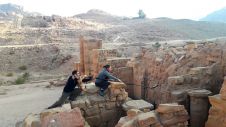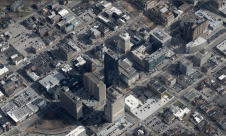OneGeology
Standards developed by the members of OGC play a key role in OneGeology, a global project to produce the first digital geological map of the world. OneGeology is supported by UNESCO and six other international umbrella bodies. It is the flagship project for the UN International Year of Planet Earth 2008.
OneGeology is made possible by standards. For example, GeoSciML, a Web-based geoscience encoding standard developed by the International Union of Geological Sciences (IUGS), Interoperability Working Group. GeoSciML is an "application schema" of GMLthe OGC's OpenGIS Geography Markup Language Encoding for representation of geospatial features and geometry. GeoSciML also uses the OpenGIS Observations and Measurements (O&M) Encoding standard. In addition to GeoSciML, OneGeology uses the OpenGIS Web Map Service Interface Standard and other OGC standards. Without such standards, geology data clients and servers around the world would not be able to interoperate across the Web as OneGeology nodes.
Up to date information
Unfortunately, information about the Earth's rocks isn't always up-to-date or usable with other data, and in some parts of the world it is not available at all. Earth and computer scientists from 79 nations set out to tackle this problem several years ago and these scientists unveiled the result of their work at the 33rd International Geological Congress in Oslo, Norway, in August 2008.
Key results OneGeology
Three key results of the OneGeology project have been identified:
- Geological maps from around the globe are accessible on the World Wide Web.
- A new web language has been written for geology which allows nations to share data with each other and the public.
- The know-how to do this is being exchanged so that all nations around the world, regardless of their development status, can take part and benefit.
The standards used by OneGeology provide a critical foundation for "open science" and the sharing of geospatial scientific data among disciplines and professions. As explained by Dr. Andrew Woolf, Leader, Environmental Informatics at the STFC Rutherford Appleton Lab e-Science Centre, Oxfordshire (UK): "Increasingly, a ‘whole Earth systems' approach to the natural environment requires data to be integrated across discipline boundaries, requiring a new approach to data management based on emerging ‘horizontal' (non-domain-specific) standards, and taking advantage of developments in internet-based information architectures."
OneGeology has 94 national participant geological surveys who provide data. Interested stakeholders also include members of the natural resources industry and several standards organizations. The OGC Interoperability Institute (OGCii), a not-for-profit subsidiary of the OGC, plays an advisory role in OneGeology.

Value staying current with geomatics?
Stay on the map with our expertly curated newsletters.
We provide educational insights, industry updates, and inspiring stories to help you learn, grow, and reach your full potential in your field. Don't miss out - subscribe today and ensure you're always informed, educated, and inspired.
Choose your newsletter(s)












